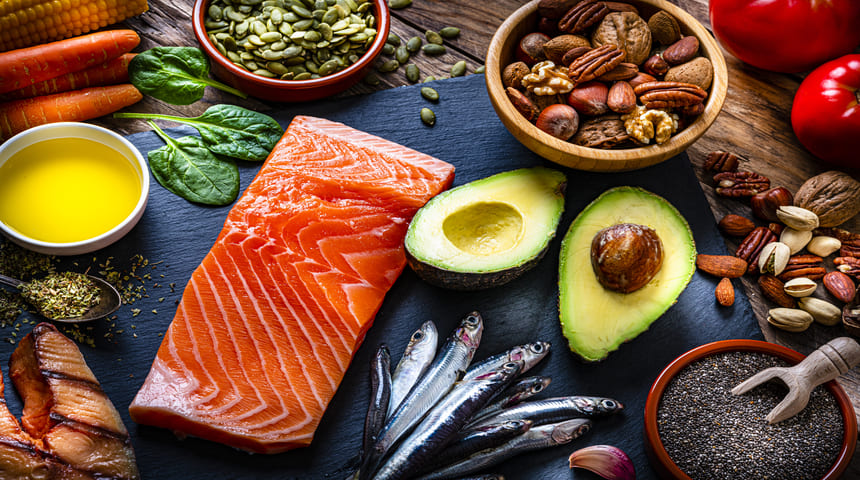8 Simple Ways to Stay Healthy When You Work a 9-to-5
More than 123 million Americans work a full-time job. When you add family obligations and social activities into that mix, there aren’t many hours left in the day.
When we’re strapped for time, eating healthy may not be at the top of our priority list. It’s much easier to grab a quick bite than preparing something with fresh ingredients. But there are ways you can eat healthy without too much of a time investment. Here’s how.
Have a Plan
Everyone is really busy, so planning is key. Take some time on the weekends to do meal prep. Use a slow cooker to prepare soups or slow cooked meats that you can eat with a side of vegetables or repurpose into a hearty salad. Pan-sear or grill meats and vegetables. Roast a chicken, a pork or pot roast and steam some vegetables or brown rice to accompany the meal. Use all the cooking tools at your disposal to knock everything out over the weekend, so you don’t have to worry about cooking during the week. Store everything in plastic containers, so you can grab a healthy meal quickly in the morning for lunch or for dinner when you get home from work.
Meal prep may take a few hours, but it’ll be worth it for all the time you save.
Don’t Skip Breakfast
People often skip breakfast, but this is the most important meal of the day. One recent study found skipping breakfast or eating late in the day may increase your risk for diabetes, heart disease and obesity. People who skip breakfast also have a 27 percent higher risk of a heart attack and a 18 percent greater risk of a stroke.
When you don’t eat breakfast, you are hungrier throughout the day. And we all know that we often don’t make the best choices when we’re hungry. So eat breakfast, even if you can’t fit a full meal in, a smoothie, healthy granola or a nut bar is better than nothing.
Eat Healthy Fats
As a dietitian, I often tell my patients that fat is an important part of a healthy diet. Many of them are shocked when I mention this and say “Oh no, I can’t eat fat. It’s too many calories.”
There’s a big difference between unhealthy fats or an overabundance of saturated and trans fats — which increase your risk for diabetes, high blood pressure, obesity and other chronic conditions — and healthy fats like olive oil, avocados, nuts and seeds. We need to eat a balance of protein, fats and carbs every day, and healthy fats are good because they make us feel full and because they keep us full.
Fat is very healthy, you just have to choose the right types of fat. If you’re looking for a quick, healthy and filling snack, grab some nuts, seeds, dark chocolate, sliced avocados or nut butter like almond butter. These are really good snacks to keep at your desk and taste delicious on their own or with a piece of fruit or crisp veggie like a celery or carrot stick.
Snacking is Good
Snacking isn’t bad for you — as long as you snack on the right foods.
Always keep healthy snacks on hand. With long work days, you may go a long time between meals. To curb cravings, make your own trail mix. Put in dark chocolate pieces (over 70% cocoa give you great health benefits), and add seeds, nuts and other healthy fats. Homemade trail mix is a good thing to keep on hand if you’re hungry because you can just eat a little bit and when you get home you won’t look for sweets. Here’s a recipe for healthy trail mix:
Simple Heart-Healthy Trail Mix
- Nuts of choice: example almonds and/or cashews (raw, no added sugar or salt)
- Granola
- Seeds: sunflower, flax, chia, etc.
- Dark chocolate pieces, for optimal health benefits buy >70% cocoa
- Mix all ingredients in a bag or bowl, then store in a large container to enjoy throughout the week.
Extra tip: Explore the bulk food section of grocery stores for a great variety of healthy options when making your own heart-healthy trail mix.
Making trail mix is quick and it’s an easy way to get additional nutrients and curb cravings. When we’re hungry our body craves nutrients; it wants quick energy. If you have a healthy snack, water or glass of milk, you won’t be quite as hungry when you get home.
And speaking of healthy snacks, make sure the food environment in your home is just as healthy as your work environment. Stock your refrigerator with healthy snacks, such as vibrant fruit, carrots, celery, hummus or peanut butter. When healthy food is easily accessible, you’re more likely to eat this as a small snack to hold you over before eating a healthy dinner or as a grab-and-go meal or quick bite while you’re at work.
Eat the Rainbow
If you’re hungry, it might be because you haven’t made the right choices. Candy bars and other sweets are indulgent, but they’re filled with empty calories that don’t help you stay full, leading to overeating and sugar cravings.
To stay on the right track, avoid fad diets and just make smart, healthy choices throughout the day. I always tell my patients to eat the rainbow, which means eating lots of fruits and vegetables. When we eat different fruits & vegetables, we actually get different nutrients so it’s important to eat a variety. Eat as close to nature as you can, and your health will benefit.
Drink Plenty of Water
Drink water throughout the day. Water is really important because most people don’t get enough of it throughout the day, and if someone is hungry, sometimes it’s really because they haven’t drank enough water.
I know drinking just water can get boring, so if you don’t like plain water, add a lemon, cucumbers, raspberries, mint or your favorite fruit. You’ll get a bit of sweetness or added flavor without all the extra calories. Bring a water bottle or gallon jug with you to work and refill it throughout the day to stay hydrated.
Read the Labels
Reading food labels is so necessary because companies market their products in all sorts of ways to trick consumers. For example, peanut butter on its own is really healthy, but many popular store brands contain added salt and sugar. All the additives make most store-bought peanut butter unhealthy. However, reading the labels on these and other products can help you make the right food choices. A good rule of thumb is to look for natural ingredients and ingredients you can pronounce. If you don’t know what something is, look up that ingredient before you buy the product. We should all be informed shoppers, so there’s nothing wrong with taking extra time to do your research.
Don’t Forget About Exercise
Even if you work an eight-hour day, there are ways to sneak in exercise. Park as far away as you can from your office to get extra exercise or walk during your lunch break to stay active. Standing, stretching and deep breathing in between work assignments will give you more energy, too. Many people have desk jobs where they sit all day, but studies have shown that sitting is bad for your health because it makes you less active and you burn fewer calories compared to when you stand. Try a treadmill desk or just walk around the office a few times a day to avoid sitting for too long.
Follow all these tips to improve your health. Some may work better for you than others or be easier for you to stick with long term. Everyone is different, so use trial and error to find what’s right for you, your schedule and your preferences. The most important thing is to make the initial effort. Taking small steps can lead to big differences in the long run for your health.
Interested in learning more about nutrition? South Lake Hospital offers free monthly classes focused on diabetes and heart health.





